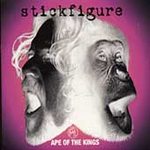 It was well-chronicled, even in his playing days, that Jack McDowell wasn’t content enough just being a rock star of a baseball pitcher but also wanted to be an actual rock star. You wonder what kind of problems a guy has to have when millions of dollars and a Cy Young Award aren’t enough; he was already famous (a legend in some quarters), already not just hanging out with Pearl Jam but getting in barfights alongside them, he was reviled in some ways while mocked by those who were either resentful or just jealous of him. In many ways, the things anyone would ever have to prove by becoming a professional musician were already the exact things McDowell had gotten out of the way by the time he walked off the mound for the last time.
It was well-chronicled, even in his playing days, that Jack McDowell wasn’t content enough just being a rock star of a baseball pitcher but also wanted to be an actual rock star. You wonder what kind of problems a guy has to have when millions of dollars and a Cy Young Award aren’t enough; he was already famous (a legend in some quarters), already not just hanging out with Pearl Jam but getting in barfights alongside them, he was reviled in some ways while mocked by those who were either resentful or just jealous of him. In many ways, the things anyone would ever have to prove by becoming a professional musician were already the exact things McDowell had gotten out of the way by the time he walked off the mound for the last time.
Thing is, while he was still taking the hill, McDowell actually released two albums with his marginally decent alt-rock group V.I.E.W. Neither lit the world on fire, but in addition to the aforementioned rock star partying he and his bandmates got to open for The Smithereens in 1992, which in the world of early ’90s alt-rock was a pretty cool accomplishment. Keep in mind that in 1992, McDowell also went 20-10 with a 3.18 ERA (in a season where the American League posted a 3.91), struck out 178 in 260.7 innings(!) and finished second in Cy Young voting. Most people working two jobs struggle to find success in just one, and here was our own Black Jack living out the dreams of every 15-year-old athlete and every 17-year-old stoner at the same time.
All of this makes McDowell’s third album a very hard listen. Ape of the Kings, released in 2002 by McDowell’s post-V.I.E.W. outfit stickfigure, finds Black Jack steering comfortably, if not expertly, through some glorious pop waters. McDowell surrounds himself with some top-shelf personnel (many of you may recognize drummer Josh Freese from various stints in Nine Inch Nails, Guns ‘N Roses and A Perfect Circle) and Black Jack’s major-key pop shows a frontman keenly aware of how to saturate his songs in guitar without drowning out his voice in the process.
The strange part about Ape of the Kings isn’t that any of the songs are inherently bad, it’s just that it’s McDowell singing them. McDowell has done some excellent turns in the broadcast booth with Hawk and D.J., but hearing a guy who so perfectly explains the flaws in throwing a change-up on a 2-0 count sing about death and Jesus is jarring to say the least. Imagine Hawk fronting a blues band or an Ed Farmer spoken word album; the results might actually be astounding, but the juxtaposition of the output against the icon makes it all almost uncomfortable. Almost.
Like most records by people who have the time, resources, skill and personnel a proper recording actually commands, Ape of the Kings isn’t really that bad. At the same time, these 13 songs will not break any ground for anyone who would have grown up aware of who Black Jack was when he was still just Black Jack. In baseball terms, this is less an audio counterpart to McDowell’s powerhouse 1993 campaign and more akin to his 1996 season in Cleveland: surrounded by some big names and theoretically cool, but in the end just an average outing from a guy with nothing to prove and, more importantly, nothing to lose.